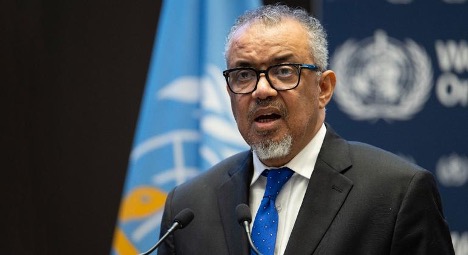By Muhammad Amaan
The Director-General of the World Health Organisation (WHO), Tedros Ghebreyesus, has urged member states to stay committed to shared global health goals in spite of ongoing global instability.
Ghebreyesus made the call at the 78th World Health Assembly (WHA) in Geneva on Monday.
“We are here to serve not our own interests, but the eight billion people of our world.
“We aim to leave a heritage for future generations and work together for a healthier, more peaceful, and more equitable world. It is possible,” he said.
The 78th WHA, WHO’s highest decision-making body, runs through May 27 and brings together delegations from 194 member states under the theme “One World for Health.”
The 2025 agenda included discussions on climate, antimicrobial resistance, and digital health, as well as a vote on the highly negotiated Pandemic Agreement.
The proposed WHO pandemic accord, which sought to prevent fragmented global responses like the one seen during COVID-19, had been the result of three years of negotiations.
If adopted, it would become only the second legally binding global health treaty under WHO’s founding rules, following the 2003 Framework Convention on Tobacco Control.
Dr Ghebreyesus also highlighted WHO’s progress in various areas, such as a one-third reduction in global smoking rates since the implementation of the tobacco control framework and efforts to improve air quality and climate-resilient health systems.
He also lauded countries like Côte d’Ivoire, Oman, and Vietnam for introducing stronger regulations on tobacco and e-cigarettes.
In maternal and child health, he noted some stalled progress but emphasised new initiatives to reduce newborn mortality.
He celebrated the global achievement of 83 per cent immunisation coverage and highlighted notable successes in disease elimination, including Cabo Verde, Egypt, and Georgia becoming malaria-free.
However, Ghebreyesus expressed concern over a 500 million dollars shortfall for the next biennium, which could reduce the scope of WHO’s work.
“Member states are expected to vote on a proposed 20 per cent increase in assessed contributions, alongside a reduced budget of 4.2 billion dollars for 2026–2027, down from the earlier proposal of 5.3 billion dollars.”
He pointed out the disproportionate global spending priorities, contrasting the WHO budget with military expenditures and the tobacco industry’s advertising costs, calling for a reevaluation of global values.
The Director-General also provided an update on WHO’s emergency operations across 89 countries, including responses to cholera, Ebola, and other outbreaks, and humanitarian efforts in conflict zones like Sudan, Ukraine, and Gaza.
In spite of extensive medical evacuations in Gaza, more than 10,000 patients still required urgent care.
Finally, Ghebreyesus outlined WHO’s future direction, which would focus on pandemic intelligence, vaccine development, digital health, and the expanded use of artificial intelligence and mRNA technology.




